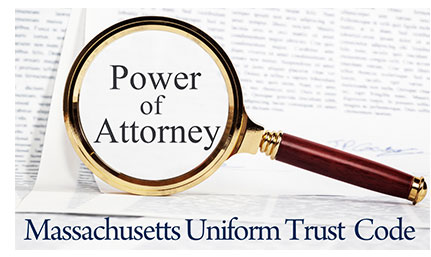| |
THIS ISSUE'S HEADLINES
How Changes To Rhode Island’s Deceptive Trade Practices Law May Impact Your Business
Governor McKee Announces RI’s Cannabis Control Commission Nominations – What’s Next?
Does an Agent Under a Power of Attorney Have the Authority to Create a Trust in Massachusetts?
Preparing for the Corporate Transparency Act - Effective January 1, 2024

HOW CHANGES TO RHODE ISLAND’S DECEPTIVE TRADE PRACTICES LAW MAY IMPACT YOUR BUSINESS
 In August of 2021, Governor McKee signed into law a significant change to Rhode Island’s Deceptive Trade Practices law. Prior to August 2021, the state’s Deceptive Trade Practices law was held to be inapplicable to “all those activities and businesses which are subject to monitoring by state or regulatory bodies.” State v. Piedmnont, 382 A.2d 819, 821-22 (R.I. 1978). Given the number of consumer transactions (involving, for example, credit card issuers, insurance/investments, automobiles, manufacturers, etc.) that are monitored by state and/or federal regulatory bodies (such as the Department of Health, the Department of Business Regulation, the Federal Reserve Board, the Federal Trade Commission and the myriad federal agencies that regulate consumer-focused industries), the protections afforded by the Deceptive Trade Practices law (R.I. Gen. Laws § 6-13.1-1, et seq.) were, as a practical matter, applicable to only a small number of consumer transactions. In August of 2021, Governor McKee signed into law a significant change to Rhode Island’s Deceptive Trade Practices law. Prior to August 2021, the state’s Deceptive Trade Practices law was held to be inapplicable to “all those activities and businesses which are subject to monitoring by state or regulatory bodies.” State v. Piedmnont, 382 A.2d 819, 821-22 (R.I. 1978). Given the number of consumer transactions (involving, for example, credit card issuers, insurance/investments, automobiles, manufacturers, etc.) that are monitored by state and/or federal regulatory bodies (such as the Department of Health, the Department of Business Regulation, the Federal Reserve Board, the Federal Trade Commission and the myriad federal agencies that regulate consumer-focused industries), the protections afforded by the Deceptive Trade Practices law (R.I. Gen. Laws § 6-13.1-1, et seq.) were, as a practical matter, applicable to only a small number of consumer transactions.
The 2021 Law changed that by giving the Attorney General, who had advocated for the passage of the 2021 Law, the power to bring, on behalf of the State of Rhode Island, a Deceptive Trade Practices’ action against any person that “is using, has used, or is about to use any method, act, or practice declared to be unlawful[,]” so long as the allegedly deceptive “activity or conduct [is not] . . . in compliance with orders . . . or rules of . . . [a] state government agency” (R.I. Gen. Laws § 6-13.1-4(b)).
Therefore, the 2021 Law now permits such Deceptive Trade Practices actions whenever a business, alleged to have committed a Deceptive Trade Practice, is not in compliance with the orders or rules of the relevant state or federal regulatory body. The 2021 Law effected change to Rhode Island’s Deceptive Trade Practices law in two other ways as well:
- initial violations may now be punished by a civil penalty of up to $10,000 (prior law had provided that an injunction must first be in place to impose such a large fine), and
- the new legislation also increased the damages available to private litigants from $200 to $500 per violation and provides for treble damages.
Since the Governor’s signature on the bill, the Attorney General, who has lauded the new legislation for providing his Office with “better equip[ment with which] to protect consumers against unfair business practices[,]” has brought numerous actions under it, moving, for example, against many automotive dealerships, a remediation/restoration company, and a document processing company. In pursuing these and other alleged violations of the Deceptive Trade Practices Act, the Attorney General will often make use of the “civil investigative demand” (“CID”) provision, contained within the Deceptive Trade Practices law (see R.I. Gen. Laws § 6-13.1-7(a) and (e)), as, according to the Attorney General, the CID is "one way for [the Attorney General] to get the information [he] need[s] . . . [to] determine whether or not a business or individual is engaged in unfair or deceptive practices and, if necessary, take enforcement action on behalf of Rhode Island consumers.”
These CID letters often prove to be – even for the most law abiding of companies that will ultimately have no issue demonstrating their compliance with the Deceptive Trade Practices Act – rather burdensome for a business to respond to; but with the assistance of experienced counsel in this area, these CID’s can be readily answered, and, even, used to bring the Attorney General’s investigation to an expeditious close. Experienced counsel can also raise potential defenses available under the new law, which has yet to be interpreted by our State Supreme Court, which asserted defenses may also result in a much more expedited resolution of an Attorney General Deceptive Trade Practices Act action.
If your business has received or anticipates receiving an Attorney General CID letter pursuant to Rhode Island’s Deceptive Trade Practices Act, immediate consultation with experienced counsel should be sought. Please contact PLDO Partner Aaron L. Weisman at 401-824-5100 or email aweisman@pldolaw.com.
[back to top]

GOVERNOR MCKEE ANNOUNCES RI’S CANNABIS CONTROL COMMISSION NOMINATIONS – WHAT’S NEXT?
 After much anticipation, Rhode Island Governor Daniel McKee made a move critical to advancing the state’s cannabis legalization efforts by naming his appointments to the new Cannabis Control Commission (“CCC”).
The announcement of Kimberly Ahern, the Governor’s current Deputy Chief of Staff, as Chairperson, along with Robert Jacquard and Layi Oduyingbo, was made on May 17, 2023, just days shy of the one-year anniversary of the Rhode Island Cannabis Act (“Act”) legalizing adult use and sales of recreational marijuana. After much anticipation, Rhode Island Governor Daniel McKee made a move critical to advancing the state’s cannabis legalization efforts by naming his appointments to the new Cannabis Control Commission (“CCC”).
The announcement of Kimberly Ahern, the Governor’s current Deputy Chief of Staff, as Chairperson, along with Robert Jacquard and Layi Oduyingbo, was made on May 17, 2023, just days shy of the one-year anniversary of the Rhode Island Cannabis Act (“Act”) legalizing adult use and sales of recreational marijuana.
Under the Act, the CCC is to be established as an independent body of three members to oversee “the regulation, licensing and control of adult use and medical cannabis.” Governor McKee originally had, by law, 40 days from the signing of the bill on May 25, 2022, to appoint members of the CCC. The months-long delay caused major frustration for existing and prospective license holders.
For one, the CCC is responsible for drafting new regulations, which will provide the framework for another round of retail licensing applications. Without a regulatory body to do so, and then subsequently accept, review and approve applications for the 33 additional licenses that the Act permits, it could take at least another year before new retailers are up and running. This is not to say, however, that aspiring licensees should be sitting idle. Rather, it would be prudent for licensees to begin the early stages of the planning process, including retaining counsel to advise on how best to positions oneself under the “certainties” of the application and operations that are already provided for in the Act.
What’s Next?
The Governor’s nominations will now be sent to the Rhode Island Senate for Advice and Consent. Upon legislative confirmation, primary authority over the medical and adult use industries will transition from the Department of Business Regulation to the CCC.
The Act also calls for the formation of a 19-person advisory board consisting of politically nominated appointees and officials. The advisory board, once formed, will work with the CCC and provide recommendations regarding the various rules and regulations, including marketing and advertising and the application/licensing process.
In conclusion, the announcement of the Governor’s appointments is a major step towards the state's embrace of cannabis legalization. However, there is still much work to be done before the industry’s full potential is realized. For questions pertaining to cannabis business and legal matters, please contact PLDO Partner Benjamin L. Rackliffe, who leads the firm’s highly experienced Cannabis Law Practice Group, at 401-824-5183 or email brackliffe@pldolaw.com.
[back to top]

DOES AN AGENT UNDER A POWER OF ATTORNEY HAVE THE AUTHORITY TO CREATE A TRUST IN MASSACHUSETTS?
 A Power of Attorney (“POA”) is an important estate planning tool and legally binding document that gives another person, chosen by you, the power to act as an agent on your behalf. Within the last year, the Massachusetts Supreme Court issued a decision effecting the authority given under a power of attorney in Massachusetts. A Power of Attorney (“POA”) is an important estate planning tool and legally binding document that gives another person, chosen by you, the power to act as an agent on your behalf. Within the last year, the Massachusetts Supreme Court issued a decision effecting the authority given under a power of attorney in Massachusetts.
In Barbetti v. Stempniewicz, the Court held that a trust was void because it was created by the son of a decedent acting under a Power of Attorney, which did not grant the express authority to create trusts. 490 Mass. 98, (2022). The Court noted that it was a matter of first impression on if a settlor could delegate the power to create a trust on behalf of the settlor to another. Additionally, the Court acknowledged that the Massachusetts Uniform Trust Code (“MUTC”) does not specifically provide whether or not the power to establish a trust is a delegable power. Instead, the MUTC only provides that a “settlor's powers with respect to revocation, amendment or distribution of trust property may be exercised by an agent under a power of attorney only to the extent expressly authorized by the terms of the trust and the power.” G. L. c. 203E, § 602 (e).
In making its determination, the Court turned to other jurisdictions for guidance and found that states varied on if the authority to create a trust was delegable, some states had adopted the Uniform Power of Attorney Act (the “UPAA”) that specifically allows a principal to authorize an agent to create a trust. Further, the Court concluded that the general weight of authority suggests that the authority to create a trust is delegable only if express authority is given by the POA.
The Court determined that because the POA at issue did not provide express authority to create a trust, the trust was void. In concluding that the Trust was void, the Court avoided deciding the greater issue on if Massachusetts’ law allows for an attorney-in-fact to create a trust document on behalf of a principal under other circumstances. Stating the
[l]egislature is currently considering whether to adopt the Uniform Power of Attorney Act, which would permit an agent acting under a power of attorney to ‘create, amend, revoke, or terminate an inter vivos trust’ on behalf of a settlor ‘only if the power of attorney expressly grants the agent the authority.’ House Bill No. 1598, at 20 (Jan. 22, 2021). Therefore, we conclude that, at this time, the more prudent path is to allow the Legislature the opportunity to decide whether and how to allow delegation of the power to create a trust.
Barbetti v. Stempniewicz, 490 Mass. at 115. Instead, the Court concluded that the POA did not provide express authority to create a trust, and, therefore the trust would be void no matter what as no authority was given under the POA.
It has been over two years since the bill was introduced and the UPAA has yet to be enacted in Massachusetts, and the landscape for authority given under a POA remains uncertain. If you have questions or would like further information on POAs in Massachusetts, please contact Attorney Katherine B. Dunn at 401-824-5100 or kdunn@pldolaw.com.
[back to top]

PREPARING FOR THE CORPORATE TRANSPARENCY ACT - EFFECTIVE JANUARY 1, 2024
 The Corporate Transparency Act (“CTA”) was passed by Congress in early 2021 to establish reporting requirements for a wide range of business entities. It also authorizes the Financial Crimes Enforcement Network of the U.S. Department of Treasury (“FINCEN”) to maintain a database of all information provided, and to disclose such information to government authorities and certain financial institutions. The Corporate Transparency Act (“CTA”) was passed by Congress in early 2021 to establish reporting requirements for a wide range of business entities. It also authorizes the Financial Crimes Enforcement Network of the U.S. Department of Treasury (“FINCEN”) to maintain a database of all information provided, and to disclose such information to government authorities and certain financial institutions.
The ultimate goal of the CTA is to assist in combatting money laundering, financing of terrorism and other illegal activities. In order to accomplish this, the CTA requires a wide range of business entities to report personal information regarding the individuals who own, control or organize covered entities to FINCEN starting January 1, 2024.
In our most recent Client Advisory about the CTA, PLDO Partner William F. Miller provides important information for businesses who may be impacted, including:
• Who must file as a reporting company?
• Beneficial owners and applicants.
• Filing deadlines.
• Information on who has access to the database?
• Practical takeaways to ensure compliance.
If you have questions or would like further information about the CTA, please contact Attorney William F. Miller at 508-420-7159 or email wmiller@pldolaw.com.
[back to top]
|
 |



 In August of 2021, Governor McKee signed into law a significant change to Rhode Island’s Deceptive Trade Practices law. Prior to August 2021, the state’s Deceptive Trade Practices law was held to be inapplicable to “all those activities and businesses which are subject to monitoring by state or regulatory bodies.” State v. Piedmnont, 382 A.2d 819, 821-22 (R.I. 1978). Given the number of consumer transactions (involving, for example, credit card issuers, insurance/investments, automobiles, manufacturers, etc.) that are monitored by state and/or federal regulatory bodies (such as the Department of Health, the Department of Business Regulation, the Federal Reserve Board, the Federal Trade Commission and the myriad federal agencies that regulate consumer-focused industries), the protections afforded by the Deceptive Trade Practices law (R.I. Gen. Laws § 6-13.1-1, et seq.) were, as a practical matter, applicable to only a small number of consumer transactions.
In August of 2021, Governor McKee signed into law a significant change to Rhode Island’s Deceptive Trade Practices law. Prior to August 2021, the state’s Deceptive Trade Practices law was held to be inapplicable to “all those activities and businesses which are subject to monitoring by state or regulatory bodies.” State v. Piedmnont, 382 A.2d 819, 821-22 (R.I. 1978). Given the number of consumer transactions (involving, for example, credit card issuers, insurance/investments, automobiles, manufacturers, etc.) that are monitored by state and/or federal regulatory bodies (such as the Department of Health, the Department of Business Regulation, the Federal Reserve Board, the Federal Trade Commission and the myriad federal agencies that regulate consumer-focused industries), the protections afforded by the Deceptive Trade Practices law (R.I. Gen. Laws § 6-13.1-1, et seq.) were, as a practical matter, applicable to only a small number of consumer transactions.  After much anticipation, Rhode Island Governor Daniel McKee made a move critical to advancing the state’s cannabis legalization efforts by naming his appointments to the new Cannabis Control Commission (“CCC”).
The announcement of Kimberly Ahern, the Governor’s current Deputy Chief of Staff, as Chairperson, along with Robert Jacquard and Layi Oduyingbo, was made on May 17, 2023, just days shy of the one-year anniversary of the
After much anticipation, Rhode Island Governor Daniel McKee made a move critical to advancing the state’s cannabis legalization efforts by naming his appointments to the new Cannabis Control Commission (“CCC”).
The announcement of Kimberly Ahern, the Governor’s current Deputy Chief of Staff, as Chairperson, along with Robert Jacquard and Layi Oduyingbo, was made on May 17, 2023, just days shy of the one-year anniversary of the  A Power of Attorney (“POA”) is an important estate planning tool and legally binding document that gives another person, chosen by you, the power to act as an agent on your behalf. Within the last year, the Massachusetts Supreme Court issued a decision effecting the authority given under a power of attorney in Massachusetts.
A Power of Attorney (“POA”) is an important estate planning tool and legally binding document that gives another person, chosen by you, the power to act as an agent on your behalf. Within the last year, the Massachusetts Supreme Court issued a decision effecting the authority given under a power of attorney in Massachusetts.  The Corporate Transparency Act (“CTA”) was passed by Congress in early 2021 to establish reporting requirements for a wide range of business entities. It also authorizes the Financial Crimes Enforcement Network of the U.S. Department of Treasury (“FINCEN”) to maintain a database of all information provided, and to disclose such information to government authorities and certain financial institutions.
The Corporate Transparency Act (“CTA”) was passed by Congress in early 2021 to establish reporting requirements for a wide range of business entities. It also authorizes the Financial Crimes Enforcement Network of the U.S. Department of Treasury (“FINCEN”) to maintain a database of all information provided, and to disclose such information to government authorities and certain financial institutions.